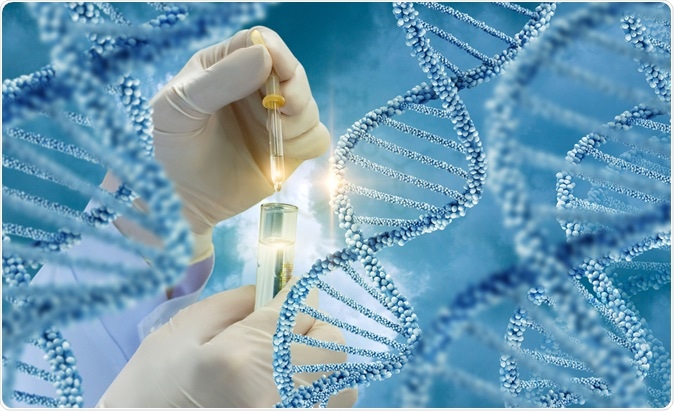There are 3.2 billion positions on the human genome and it requires a study of huge number of genetic variations in the populations to estimate the associations between genetic disorders and mutations. Two new studies have been published in the journal Nature. These studies have all shown the value of genetic information and understanding in treatment and understanding of various diseases.

Image Credit: Natali_ Mis / Shutterstock
Both of these papers are based on the globally largest biological database – the UK Biobank. This database records the genetic data as well as the lifestyle information, body measurements along with examination of urine, saliva and blood. Whole of the genome of the participants were not recorded. Instead only 800,000 genetic markers from the DNA was recorded. The participants were half a million and they were aged between 40 and 69 years.
The first study published is the analysis of the whole Biobank database. This study is titled, “The UK Biobank resource with deep phenotyping and genomic data.” In this study the genetic marker data from the database is analysed using a statistical method called genotype imputation. This method can fill the gaps in the genetic information from the available data using probability. Jonathan Marchini, professor of statistical genomics at the University of Oxford was one of the authors of this paper. He explained genetic imputation using an analogy, “If you take a given novel, and only read every tenth word, you can predict all of the other words in the novel from all of the novels in a given library.”
The second study published was not pure statistics alone but also neuroimaging and genetics. It is titled, “Genome-wide association studies of brain imaging phenotypes in UK Biobank”. Marchini was also a part of this second study along with other researchers at the University of Oxford. In this study the team compared the genetic data from the UK Biobank and compared it to 10,000 MRI scans of the participants. Brain disorders and MRI abnormalities could be connected in 150 individual findings where clear relationships could be found. Genetic connections with diseases such as multiple sclerosis, motor neurone disease and strokes could be found. These were linked to the genes that work by repairing the white matter in the brain. Genes could also be linked to iron deposits in the brain seen in diseases such as Alzheimer’s and Parkinson’s.
Stephen Smith, professor of biomedical engineering and head of analysis at the Wellcome Trust Centre for Integrative Neuroimaging (WIN) at Oxford University and a co-author of the second paper explained that there have been studies connecting genetic mutations with brain diseases. This study is unique because of its “combination of factors”. He explained that this study not only is more robust because of the large population analysed but also because it uses 3,000 different measurements in the tests conducted.
Experts have said that the information in the Biobank could be used for variety of studies in future and could provide deeper understanding of several disease conditions. Risk factors and imaging abnormalities connected to the mutations could help diagnose the disease early and also devise targeted therapies, Smith explained. Karla Miller professor of biomedical engineering at the WIN at Oxford was also on the team of the second paper. She said that this second study shows that not only can researchers predict which treatment would be best suitable for which patient but can also monitor how a patient responds to a drug. “We can learn even more about how genetics affect brain development, agieng and disease, and see much more about how and where in the brain this happens,” she said.
Marchini too said in the same lines that these studies and genome-wide association studies (GWAS) help in deeper understanding of the relationship between the diseases and the genes. He warned that this does not show that a particular gene change causes the disease but merely shows an association. He called the Biobank data “game changing” in research because of its size.